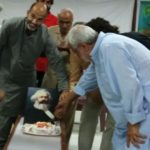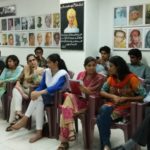Special Report
People from various strata of life — communists, socialists, workers, peasants, students, youth and intellectuals — across the world including Pakistan celebrated the 200th birth anniversary of Karl Marx, the greatest philosophers of the millennium, social scientist and leader of the working class on Saturday, May 5.
In Pakistan Awami Workers Party (AWP) paid homage to the great thinker, by organizing cake-cutting ceremonies and discussions at various units. A cake cutting ceremony was held at Karachi main secretariat that was attended by AWP leadership, including senior vice president Yousafmasty Khan, federal general secretary Akhtar Hussain Advocate, Punjab President Dr Asim Sajjad Akhtar, Sindh presidents Bakhshal Thallo, Railways workers Union leader Manzoor Razi and educationist Hajra Ahmed and a large number young comrades.
They discussed the workers’ movements and party building in the light of Marx’s ideology and its relevance in today’s world. They stressed the need for educating working class and young activists about Marxism, its reinterpretation and application.
They also called for unity in the party and reaching out to broader mass to speed up the struggle against neoliberal economic agenda of the imperialist capitalist world, feudal remnants, religious extremism, and militarization of society, politics and economy.
A dialogue on Marxism was organised by the Progressive Writers Association at SAFMA to celebrate Marx’s 200th birthday. AWP founding president, a Marxist ideologue, constitutional expert and author Abid Hasan Minto, Senator Aitzaz Ahsan, AWP Rawalpindi District Education secretary and educationist Prof Yousaf Hassan, Comrade Lal Khan, author and thinker Qazi Javed, writer Abid Husain Abid, journalist Imtiaz Alam spoke on the occasion.
A cake cutting ceremony was held at Lahore office participated by AWP vice-president Abida Choudhry, finance secretary Shazia Khan, Hanif Goraya, Lahore District President Ghulam Mujtaba, Advocate Liaqat Naseer and others.
A ceremony was also held at Multan, Naseerabad and Sanghar Sindh.
EUROPE
In European cities, people paid homage to the great thinker.
In Germany’s Trier, Marx hometown, a larger than life statue of Marx was unveiled.
The celebratory uncovering of the 14-feet statue of Marx, donated by China was held at Trier. About 200 guests, including a delegation from China, applauded during the anniversary celebrations when a bright red cover was lifted from the statue which depicts Marx with a frock and his signature bushy beard.
The statue’s height, 5.5 meters (18 feet), was designed in accordance with his birthday — May 5, its creator Wu Weishan said.
Weighing 2.3 ton, the bronze figure was mounted atop a pedestal in front of a former Marx family home.
Marx, the son of a Jewish lawyer, spent 17 years in Trier, before becoming one of the most influential thinkers in the world.
Politicians including the European Commission President, Jean-Claude Juncker, and Germany’s Social Democrat leader, Andrea Nahles, gave speeches at the unveiling of the statue gifted by the Chinese government, which has been welcomed even by members of Angela Merkel’s centre-right Christian Democratic Union.
“Thirty years ago, such a statue wouldn’t have been possible,” said Wolfram Leibe, Trier’s Social Democrat mayor. “But today, with more distance to the socialism of the German Democratic Republic, is the right time to engage with Marx in this form too.”
Marx’s ideas are of great value to the world, and in particular had far-reaching influence on China,” Guo Weimin, deputy director of the State Council Information Office of China, said in a speech to mark the unveiling of the statue.
Malu Dreyer, the governor of the state of Rhineland-Palatinate, in which Trier is located, called the statue from China “a pillar and a bridge for our partnership”.
When Germany was divided after the end of the Second World War, the eastern part was under communist rule from 1949 until the country’s reunification in 1990.
CHINA
In China, President Xi Jinping hailed Karl Marx as “the greatest thinker of modern times”.
“Today, we commemorate Marx in order to pay tribute to the greatest thinker in the history of mankind and also to declare our firm belief in the scientific truth of Marxism,” Mr Xi said during an address on Friday at the Great Hall of the People in Beijing.
Renewed interest in Marx fires celebrations
Two hundred years after the philosopher’s birth, a small industry is gathering pace, from plans for major events in Trier, the city on the Moselle where he was born, to a new tour of the Manchester streets that he and Friedrich Engels walked as they discussed the condition of the city’s emerging working class. The bicentenary on 5 May will be marked with exhibitions, lectures, conferences, histories and novels.
The books are starting to pile up. Last month saw a new edition of Marxism – a Graphic Guide, a collaboration by philosophy lecturer Rupert Woodfin and comic book artist Oscar Zárate, while titles by heavyweight specialists on Marxism are on the way. They include a reprint of literary theorist Terry Eagleton’s bestselling Why Marx Was Right, along with a new edition of The Communist Manifesto – which starts with the “spectre” quotation – including an introduction by the former Greek finance minister Yanis Varoufakis.
The Murderer of Warren Street by Oxford University historian Marc Mulholland, published at the end of May, promises to tell the story of villain Emmanuel Barthélemy (“the man who wanted to kill Marx”).
Marx’s ideas, running through the Russian revolution to the present day, will be the focus of Marx and Marxism, a new book by one of Britain’s foremost historians of socialism, Gregory Claeys. The influence of the Labour Party under Jeremy Corbyn – as well as factors such as reduced employment prospects and a desire to challenge austerity – are credited by Claeys as helping to engender a renewed interest in Marx, particularly among the young.
“Marx’s prose may seem somewhat obtuse to modern readers,” Claeys said. “But Marx’s central premise – that the most obvious and extreme forms of oppression and exploitation can be removed from everyday life – retains a robustness and daring paralleled by no other thinkers in the modern period.”
Fact is accompanied by fiction. Marx Returns, due out on 23 February and written by Jason Barker, is billed as combining historical fiction, psychological mystery, philosophy and extracts from Marx’s and Engels’s collected works to reimagine the life and times of Marx.
Marx laid the philosophical foundations for communism, an ideology that aims for shared ownership of the means of production and the absence of social classes. He explained his thoughts in two famous works, the Communist Manifesto and Das Kapital.
Marx’s Das Kapital is climbing back into the bestseller charts and a raft of biographies and TV dramas celebrate the enduring relevance of his ideas. Even Frankfurter Allgemeine Zeitung, the centre-right bourgeoisie’s broadsheet of choice, last Sunday put Marx on its front page and let its staff writers choose their favourite passages from his oeuvre.
Thomas Steinfeld, a former editor of Süddeutsche Zeitung’s reviews section and author of a recently published book on Marx’s philosophy, said a revival of Marxist thinking had been in full swing since the 2008 financial crisis. “The economists on our business pages were only able to explain the market as a system that worked. But the crisis forced us to confront Marx’s alternative: what if markets are latently catastrophic?
“We live in an age that is as pious as the middle ages, but now we define ourselves not through a divine order but capital relation. Going back to Marx allows us to recognise this condition from the outside.”
Dieter Kowallick, a local politician for the leftwing Die Linke party in the state of Mecklenburg-Vorpommern, said: “When it comes to reading Marx, the west is now more progressive than the east.” In the run-up to the anniversary, Kowallick and his comrades had proposed the Neubrandenburg Marx be re-erected in the city.
But the task of finding an appropriately symbolic location proved divisive. While left-wingers wanted to see the philosopher outside the local library, other members of the Senate insisted Marx be placed outside the former Stasi prison, to remind people of the injustices committed in his name.
In London, the Marx Memorial Library organized an international conference celebrating Marx’s work and exploring the significance of Marxism in the world today.
Ben Fine, an economics professor at School of Oriental and African Studies of the University of London, said that what Marx put forward over 100 years ago still has far-reaching impact.
For westerners, Marx’s analysis of capitalism is worth studying, the professor said, underlining that it’s of great significance to stage the conference in London, where Marx was laid rest after living for many years.
Shadow chancellor John McDonnell – arguably Britain’s best-known Marxist –spoke on the theme of “Into the 21st century: Marxism as a force for change today” alongside guests from around the world, including Sitaram Yechury, the general-secretary of the Communist Party of India-Marxist(CMI-M), and Luo Wendong, a professor from the Chinese Academy of Social Sciences.
Meirian Jump, the archivist at the memorial library, said interest had increased in Marxism in the past couple of years, while numbers attending lectures on Marxism and conducting research in the library’s reading room have risen in recent months.
BELGIUM: In Brussels, the Chinese People’s Association for Friendship with Foreign Countries (CPAFFC) and the Belgium-China Association Saturday jointly organized a seminar marking the 200th anniversary of Marx’s birth.
The seminar, circling around the topic of Marxism in the world and in particular in China, brought together about 20 experts and scholars who studied Marxism in Belgium, France, Switzerland, and China.
Hans Van Duysen, chairman of the Belgium-China Association, pointed out that despite the world entering a new modern era, Marxism is not out of date and the West must reflect on its own crises.
“China has opened up a development model that is different from the West, and has found a suitable development path for itself which has led to extraordinary achievements,” said Duysen.
“I believe that the Chinese model will have the resources to help the world overcome possible future crises,” he added.
Separately, the Belgian Workers’ Party (PTB) held a multinational event in downtown Brussels on Saturday night.
FINLAND: READING MARX’S WORK
In the Finnish city of Pori, works of Karl Marx were read aloud at the market square.
Juha-Pekka Vaisanen, chairman of Finnish Communist Party, told the shoppers that neoliberal economic policies have decisively contributed to the “resurrection” of Marx as a popular phenomenon.
Vaisanen has been touring Finland this spring giving public readings of Karl Marx.
In his address in Pori, Vaisanen referred to Chinese leader’s suggestion that reading of Marx could become a habit.
Vaisanen underlined that Marx is not only relevant for the economists, but for everyone at a time “when the robots may snatch your job”, and “the robots do not need social security”.
Finnish Communist Party has recently published again in Finnish language parts of Das Kapital, the masterpiece of Marx.








